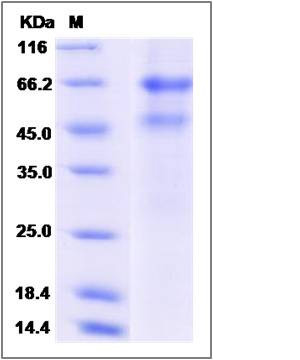Rhesus ADAM8 Protein (His Tag)
ADAM8
- 100ug (NPP2892) Please inquiry
| Catalog Number | P90278-C08H |
|---|---|
| Organism Species | Rhesus |
| Host | Human Cells |
| Synonyms | ADAM8 |
| Molecular Weight | The recombinant rhesus ADAM8 comprises 488 amino acids and has a calculated molecular mass of 53.6 KDa. |
| predicted N | Arg 21 |
| SDS-PAGE |  |
| Purity | (50.8+34.6) % as determined by SDS-PAGE |
| Protein Construction | A DNA sequence encoding the rhesus ADAM8 (XP_002805919.1) (Met1-Pro497) was expressed with a polyhistidine tag at the C-terminus. |
| Bio-activity | Measured by its ability to cleave a fluorogenic peptide substrate Mca-PLAQAV-Dpa-RSSSR-NH2, R&D Systems, Catalog # ES003. The specific activity is > 0.5 pmols/min/μg. |
| Research Area | Signaling |Signal Transduction |Cellular Senescence and Pathways in Aging |Apoptosis |Apoptosis Receptors |Receptor Processing | |
| Formulation | Lyophilized from sterile 1 |
| Background | ADAM8, also known as CD156, is a member of the ADAM (a disintegrin and metalloprotease domain) family. Members of this family are membrane-anchored proteins structurally related to snake venom disintegrins, and have been implicated in a variety of biological processes involving cell-cell and cell-matrix interactions, including fertilization, muscle development, and neurogenesis. ADAM8 is possiblely involved in extravasation of leukocytes As a metalloprotease, ADAM8 also may be involved in cell adhesion during neurodegeneration, and it is thought to be a target for allergic respiratory diseases, including asthma. |
| Reference |
